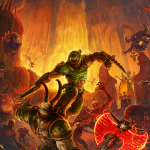Only the other day we were calling out Steam on its poor curation of the 14,500 games added to the store last year. Now we learn of a tiny step forward in the clumsy storefront’s usefulness: a new genre category for boomer shooters. This is the term for classic or classic-style first-person shooters with a deeply ‘90s vibe, and it’s a genre that’s bursting with greatness. So let’s celebrate some of the best.
Let’s try to defy terms. The boomer shooter is a fast-paced FPS, usually with low-poly art, with ammo and health scattered around the levels by magic fairies, and where enemies explode into gruesome chunks and walls are lined with secret doors. You find coloured keys to open matching doors, and you unlock an ever-growing arsenal of increasingly ridiculous weapons. They either are, or hark back to, games like Doom, Duke Nukem 3D, and Heretic.
The term “boomer shooter” first came about during the development of one of the best modern examples of the genre, 2018’s Dusk, says composer Andrew Hulshutt. It was a “cheeky” term the team came up with to describe 1993’s Doom, alluding to the idea that the people who played it at the time might have been of the boomer generation. (Yes, the games themselves are Millennials, but that’s not the point. My dad was playing Doom in ‘93, and he’d be 73 this year if he’d remembered to be alive.) The term stuck, and Dusk was described as such in its marketing, and the term—like the rebirth of the retro-RPS in Dusk’s wake—caught on.
Now it’s as official as anything as nebulous as a genre ever can be, gaining its own proper tag on Steam. (Although, in fairness, Humble did use the term for a bundle in 2022.) Which means for retro-RPS lovers like me, we can finally categorize them all together. And as such, spot any we might have missed.
Read on for some suggestions of where to start with the boomer shooter, or perhaps to fill in some gaps in your library, because these ‘90s-style FPS games are hitting it so hard right now. And please, believe me, I’ve left off some stunning games for reasons of time and space. Add the missing suggestions in the comments.
























